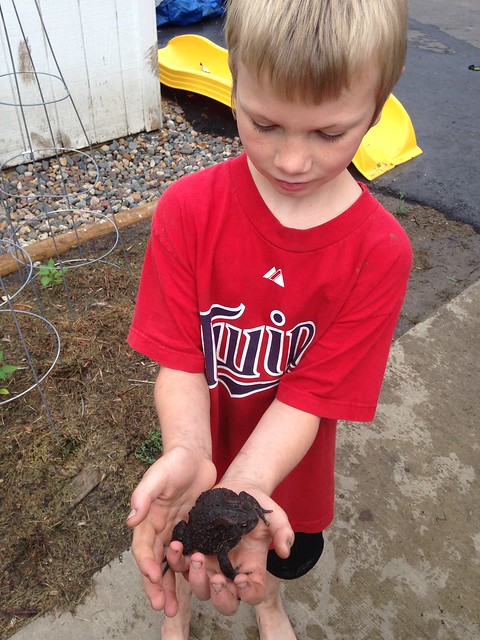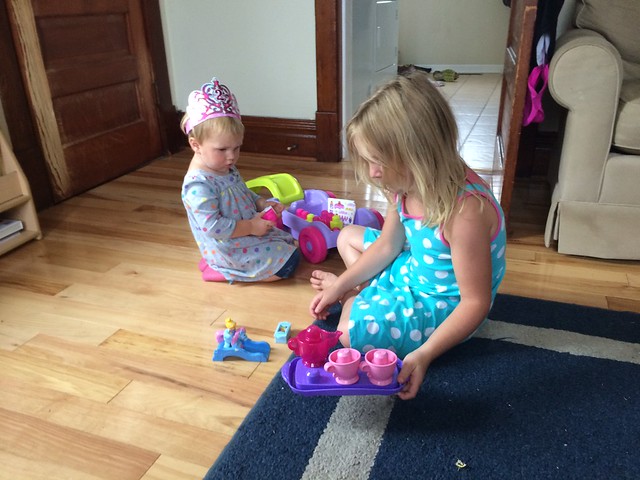A few weeks ago a friend asked me a question about preschool and somehow we got to the fact that while I could almost certainly walk into any preschool in the area and walk out with a job (were one available) I don’t think I would want to.
The truth is, I think I might hate teaching preschool in the year 2015.
The reason I suspect I would hate such a move has nothing to do with not wanting to work with children that age or not thinking it was an important or noble profession. It has nothing to do with preferring to be at home or any logistical concerns working would create.
I say this, because I hate what has become defined socially and politically, and ever increasingly professionally, as “good” early childhood… even in just the last 10 years.
I had my first introduction to academic preschool as a classroom teacher at a private daycare chain in 2004. The program had a set reading curriculum for all students ages 3 and up. We used Teach Your Child to Read in 100 Easy Lessons for ALL STUDENTS 4 and up regardless of readiness, and with any 3 year old that could pay attention for the lessons. It had only been two short years since I took my language arts sequence in college and there we talked about direct instruction reading (which TYCTR is and why I will not use it or recommend it to other homeschooling families) as a tool for struggling students and how it was generally only used in classrooms for schools that were failing their NCLB benchmarks.
I naively thought that if I brought this information to the program directors and parents, and presented them with all of the other ways that we could build literacy skills in preschools that surely I would be allowed to do something different in my classroom.
Sending program graduates to kindergarten reading, however, apparently is good for the bottom line. School district loved it and referred other parents to our program. Parents loved feeling like their kids had a jump start to the top of the class (3 and 4 year olds!). Program directors loved the income and price hikes that go with having a waiting list.
I lasted 9 months.
Thankfully I had other options, as our local church community wanted to open their own preschool program. I’m not sure what they had in mind, but as the program director I set out from the start to create a play based learning structure that didn’t just give lip service to play. We had learning centers and did literacy activities, of course, but the goal was not to teach the children to read (or any other standardized list of skills) but rather ensure that they were well rounded and ready for all aspects of kindergarten rather than simply academics. I faced some initial resistance from parents who wondered why I didn’t send home homework (homework?) as apparently the other preschool in town at the time did, but the idea caught on and in my two years with the program we heard primarily positive feedback from both parents and teachers. We opened as a 2 morning a week program and in 2 years came to be open 5 mornings and 3 afternoons per week.
I know the program has continued to thrive, although I am always afraid to ask if they have maintained their academics-second roots.
If you have a currently preschool aged child, you have probably already noted the differences that 10 years can make. The standard in early childhood has become much more like the former and the latter is disappearing. This holds true, not just for early childhood but also for elementary school and those who dare to deviate from the expectation are increasingly criticized.
Take the principal in New York that decided not to give homework at the elementary levels any longer. She is an educated, certified educational professional who did her research and realized that homework has not been proven to improve academic achievement in elementary school students. She made a curricular decision based on this research-based fact. She didn’t just decide it was too much work for teachers to grade or anything. She based this on research.
Oh the outcry!
One parent is quoted as saying, “They’ve decided that giving homework to younger ages [elementary school students] isn’t viable. I don’t necessarily agree.”
You don’t agree?
Consider this, you bring your child to the doctor with a sore throat. The doctor is an educated, certified medical professional who does his or her research (throat culture) and determines that the best course of treatment would be a round of antibiotics. But really, you don’t agree so you go to the internet and bash this doctor and call for their removal or threaten to find a new doctor, maybe even a whole new clinic just in case this problem of using evidence-based practices in spreading.
All because she did what she is trained and paid to do.
Of course, this reaches back into a secondary problem with our education system..it’s treatment of teachers as professionals which is really a whole other post, but I digress.
The point is that no one listens when someone, even (maybe especially) an educational authority, says that kids need more time to play and read books of their choosing. That they need time outside and responsibility. Time around the dinner table with their family, nurturing relationships rather than arguing over homework problems.
The parent above, goes on to say, “some of it is about discipline- I want [my daughter] to have fun but I also want her working toward a goal.” (You can read the entire article here.)
Parents have forgotten that they learned about goals by building forts and solving problems in the back yard. They learned discipline by watching their parents demonstrate discipline in their professions and by eating dinner at the same time every night and participating in family rituals such as prayer before meals or chores. They remember having homework in high school and assume they always did, but the truth is they didn’t. Our memories of elementary school are vague at best.
I recently saw an article about a 1st grade readiness checklist from 1979, probably with 10 years of first grade for most parents. The book the article refers to was published by the Gisell Institute, which continues to be a name in child development research. (Currently, their research focuses more on the best practices for implementing current standards, rather than if those standards are any good in the first place. That being said, they site play, exploration, and secure relationships as premier learning modalities for early childhood.) I used to have copies of Your three, four, and five year old. Think of these as the goals of kindergarten instruction in 1979.
1. Will your child be six years, six months or older when he begins first grade and starts receiving reading instruction?
In order to “pass” this checklist, students needed to score 10/12 points. I have news for you. My four year old, in the year 2015, just scored 9 points. (He’s obviously not six and he hasn’t lost any teeth yet.) He passes all of the academic skills, motor skills, and social/emotional skills. The only skill he hasn’t passed would be traveling alone in the neighborhood and by 2015 standards he is more independent than most kids his age. In fact, he’s definitely tapped out what I am comfortable letting him do for fear of being arrested. (Google it, this is not just one case in just one state..it is really happening when parents move to promote independence in their children.)
I remember 5 is when I let Aidan (now 11) turn the corners by himself when we took a walk around our block. He didn’t have cross any streets, so I would let him go ahead of us and sometimes he would even lap us. But even 5 years ago we didn’t hear about children being stripped of their parents for this sort of thing.
Now… I’m not so sure.
I recently had dinner with a long-time friend and former co-worker who left classroom teaching to open an in-home daycare, the only way she could financially stay home with her kids while they were little. She has watched the changes in pushing academics on preschoolers and seen the impact that had even on home daycare providers. Her youngest child will be entering kindergarten this fall and she is not renewing her daycare license. She says there are too many restrictions and regulations and things are changing too much. It’s no longer enough to love babies and toddlers and to help them play. Keeping them safe now entails an entirely different mindset.
It’s not just preschool expectations that are changing, now it’s toddlers. Toddlers are now expected to know all sorts of things and children who aren’t magically potty trained at 2 are “behind”. I’ve even seen many articles promoting Montessori techniques to teach your toddler their letter sounds. If I’m being blunt, Montessori would roll over in her grave to think of her methods being used to manipulate (yes I will go out on a limb and say I think it is manipulation) young children into learning skills that they have no reason to learn. I will point out, however, that young children are extraordinarily eager to learn that which they perceive their parents to deem important so if you are extremely focused on academics than yes your child probably is interested and motivated to learn to read early. They are normalizing to their environment and prioritizing academics over self-reliance, responsibility, social-skills, or other areas.
Montessori, on the other hand I believe, would have been all for asking 6 year olds to walk to the store independently.
My friend said it best, just because a 13 year old can get pregnant doesn’t mean she should.
Just because we can teach our toddlers and preschoolers to read, doesn’t mean they are ready to learn it.
What must we sacrifice in our efforts to heavily structure toddler and preschool learning?
And what is the cost of doing so?
For all the reasons I could give you for homeschooling, do you want to know why I really do it?
Because I want my kids to have a childhood full of play, outside time, problem solving, positive relationships, and the freedom to develop their God-given gifts and talents.
And the more I see, the more I’m convinced they can’t get that anywhere else.




Amen! Amen!
Have you read Anthony Esolen's "10 ways to destroy the imagination of your child?" You would enjoy it, or it would infuriate you (both for me!)